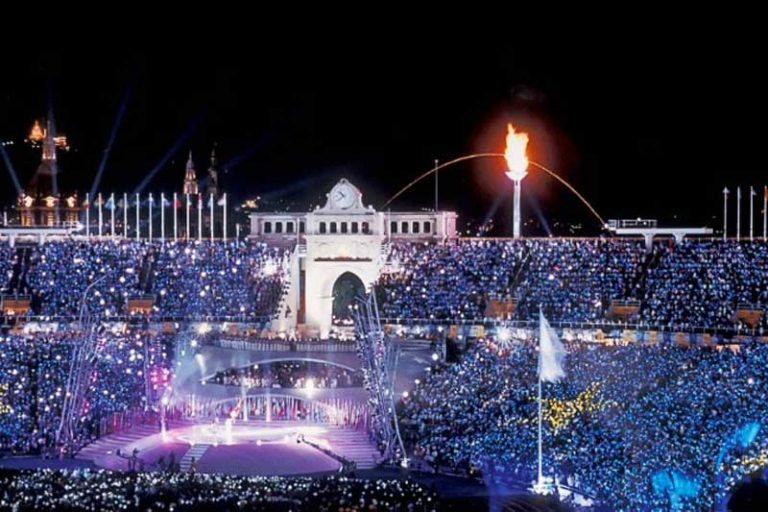Innsbruck’s Olympic Winter Games bid was stopped dead in its tracks Sunday after it was narrowly defeated in a public referendum across Innsbruck and Tirol. Austrian Olympic officials along with the International Olympic Committee (IOC) will view this as a major setback after struggling to recover the image of the Games and reform the bid process in order to make it more palatable for governments and the general public.

With all 279 of the polls reporting, only 46.65 percent approve the Olympic bid while 53.35 stand against it.
In Innsbruck alone, the vote was more negative with only 32.95 percent in support and 67.41 percent voting ‘no’. While there are still voting cards to be counted, a large majority of those would have to be in favor of the bid to turn the results around.
The failed referendum means that Innsbruck will be prevented from entering the race.
Over the past several weeks the Innsbruck 2026 bid committee had taken to the streets and social media to aggressively promote the bid and to get voters to the polls to support the project. The IOC did its part by launching a new bid process designed to keep costs and risks low, and to work with the cities to ensure only feasible plans move forward.
The Innsbruck 2026 Facebook page was updated after the results with the message “Thank you for your support,” in German.
Austrian government officials approved the bid in June after a positive feasibility study, but due to the financial commitment and associated risks residents of Innsbruck have been given the final say of whether the project moves forward. Initial estimates put a price tag of €1.175 billion (USD $1.3 billion) on the organization of the Games that makes heavy use of existing facilities, infrastructure and accommodation.
The timing of the vote was not ideal, coming only a week following the arrest of Rio 2016 Olympic Games Chief and Bid Chief Carlos Nuzman, who is accused of being part of a vote-buying conspiracy that helped the Brazilian city win the first Games in South America. Fears of corruption have stalled bids across Europe in recent years.
Sunday’s referendum comes after a long string of failed Olympic bid votes across Europe this century. For the 2024 Olympic Games Hamburg’s bid was narrowly defeated by about one percent, while a petition to force a referendum in Budapest was enough public push-back to force the city’s Mayor to end Hungary’s campaign.
For the 2022 Winter Games Krakow’s bid was devastated when over 70 per cent voted against plans, and Munich in Germany and Davos in Switzerland were prevented from entering the race when they were both felled by referndums before applications were due. Oslo’s bid moved forward after it barely won a vote with 53.5 per cent support, but a loss of federal government backing later ended the Norwegian campaign.
Berne in Switzerland was forced out of the 2010 Winter Games race after being defeated by public vote but Vancouver’s plebiscite was successful and the Canadian city went on to host the Games.
Innsbruck successfully bid for the Olympic Winter Games in 1964 and was later also awarded the 1976 Games after Denver citizens refused to host the Games that the city had already won. Innsbruck also hosted the first Winter Youth Olympic Games in 2012.
On Monday, a potential bid from Calgary will be closely watching a municipal election that will shape the city council who will be responsible for approving whether a Canadian bid enters the 2022 race. Another possible entry from Sion in Switzerland is waiting for Federal government approval of its plans before it can file an application due into the IOC March 31. A decision had been expected last Wednesday but the Federal Council said it needed more time to review the project details.
Sion, if the the Swiss bid is approved, will also hold a referendum in October 2018 but Calgary City Council already voted against any possible referendum over its pending bid.
Other possible bids are less-developed but could come from Stockholm in Sweden, Almaty in Kazakhstan or Erzurum in Turkey. At the moment, however, there are no bids that are certain to be standing on election day.
The United States is also interested in a 2026 or 2030 Winter Games bid, and it is thought an American city could step in at the last minute should the other host city prospects for the Games fail. Interestingly it was Innsbruck that stepped in in 1976 after U.S.city Denver voters rejected the Games that were already won. Denver, along with Reno-Tahoe and 2002 host Salt Lake City are said to be among the current American hopefuls.
The IOC last month launched the new bid process for the siting of the 2026 Games and vows to keep costs low and to work with interested cities collaboratively to build better plans before it elects a winning city September 2019 in Milan, Italy.
(With reporting by Christof Schmitz)
More to come…


